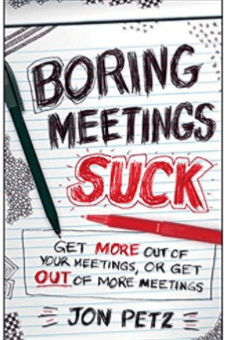10 Must-Haves to Stop Wasting Time
- Agenda. ALWAYS send a clear and specific agenda at least 48 hours prior to the meeting, and ask for participants’ input. Clearly communicate an action step for each agenda item. Follow your agenda and stay on track.
- Right Participants. Take time to identify who really needs to attend and why. Only meet to create value.
- Respect Time. Start and end on time to communicate that you’re organized and respect others’ time. Starting late creates the reputation that you don’t respect your listeners’ time and that it’s okay for them to arrive late. Meet for 45 minutes rather than an hour. Since the actual work of most meetings can be completed in 45 minutes, use the extra 15 minutes to transition from one meeting to the next.
- Focus. Tech gadgets or no tech gadgets? If you’re going to allow these in your meetings, make sure you and your message are more interesting to keep your listeners’ attention. Without your listeners’ attention, influence cannot occur.
- Make It About Your Listener. Identify your listeners’ “WHY.” Build your message to meet their WHY. For example: Why is this topic important to your listeners? Why would they want to listen to you? Why is this meeting happening now?
- Rules of Engagement.Be specific on how you want your listeners to interact rather than you lecturing to them. Immediately interact with them by asking open-ended questions. You will build a reputation as someone who is engaging and doesn’t waste people’s time.
- Consider Stand-Up Meetings. Research indicates that this approach creates faster and more meaningful decisions.
- Call to Action.Close with a specific call to action to avoid wasting your listeners’ time. Schedule next steps before you leave. Here’s an example of a specific call to action: By Friday of this week, submit your action plan for completing our customer surveys by the end of this month.
- Reduce Wasted Time. Effective meetings are effective because they get to the point. Increase the urgency to avoid participants who are tempted to waste time. Avoid letting participants get into the weeds and derail the conversation. As the leader, it’s your responsibility to respect everyone’s time by keeping everyone on track and the conversation moving forward.
- Audio and video record yourself during meetings to see and hear what your listeners observe rather than what you believe to be true. We cannot improve when we are basing our influence on how we feel rather than how others perceive us.
Drop me a note to share the action steps you will commit to this month to deliver meetings that influence action. Tag me on my Facebook page.
If you missed one of Stacey’s previous blogs or tips, visit her online.
Click here to receive our “10 Lies Business People believe about Their Influence”

What Achievers Read:
Boring Meetings Suck: Get More Out of Your Meetings, or Get Out of More Meetings,




